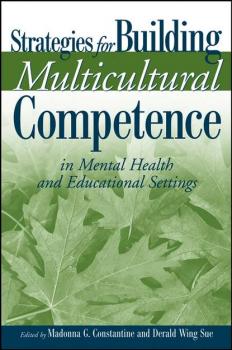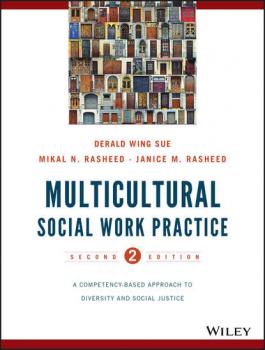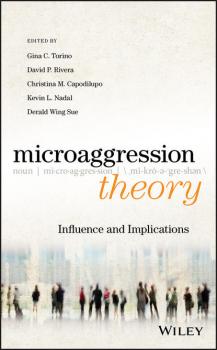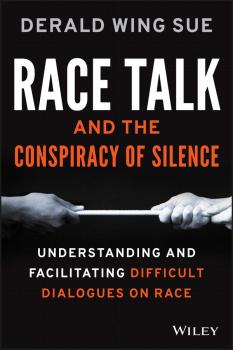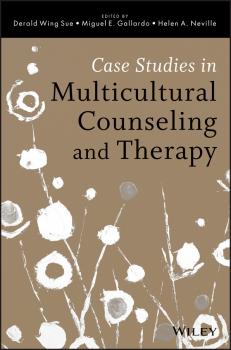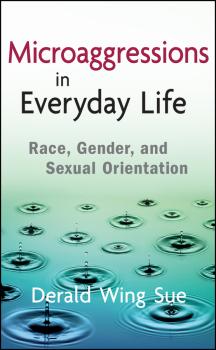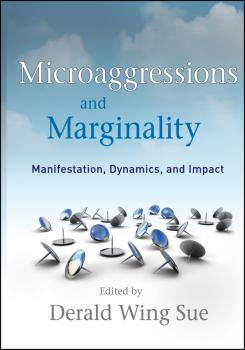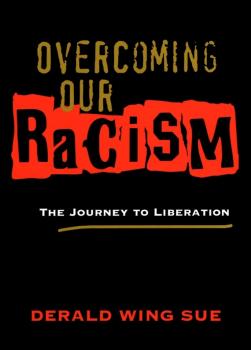ТОП просматриваемых книг сайта:
Derald Sue Wing
Список книг автора Derald Sue WingStrategies for Building Multicultural Competence in Mental Health and Educational Settings - Derald Sue Wing
Аннотация
A must-read book for all mental health professionals wanting to keep up with today's most important clients…practical, concrete, hands-on details from firsthand experts on ethnic populations. –Richard Suinn, PhD, Colorado State University, Past president (1999), American Psychological Association The rich mosaic of racial and ethnic diversity defines our society now more than ever. For students and professional psychologists, this translates into a critical need to address a range of cultural diversity issues, as well as potential biases. Recently, the American Psychological Association (APA) recognized the importance of cultural competence for psychologists through its adoption of its Multicultural Guidelines. Applying those guidelines to real-world practice is both complex and challenging. Only one text brings it all into sharp focus: Strategies for Building Multicultural Competence in Mental Health and Educational Settings. Edited and written by renowned multicultural experts, this informative guide is full of concrete strategies and case examples, all geared toward achieving the goal of culturally competent practice. Chapter by chapter, it uses a variety of practice modalities in various settings to help all mental health professionals increase their familiarity and compliance with the APA Multicultural Guidelines. Beginning with a useful summary of the APA guidelines, Strategies for Building Multicultural Competence in Mental Health and Educational Settings covers the guidelines' relevance to: * Individual and group counseling * Couples and family counseling * Career counseling with people of color * Independent practice settings * Multicultural consultations and organizational change * Academic mental health training settings * Clinical and hospital settings * College counseling center settings * Elementary and secondary school settings This timely reference also considers building multicultural competence around indigenous healing practices; in clinical supervision contexts; and in culturally sensitive research. Taken together, the book is a much-needed blueprint for making culturally informed decisions, explaining how the multicultural initiatives you implement today can he'p shape the field's future.
Аннотация
A thorough exploration of diversity and social justice within the field of social work Multicultural Social Work Practice: A Competency-Based Approach to Diversity and Social Justice, 2nd Edition has been aligned with the Council on Social Work Education's 2015 Educational Policy and Standards and incorporates the National Association of Social Workers Standards of Cultural Competence. New chapters focus on theoretical perspectives of critical race theory, microaggressions and changing societal attitudes, and evidence-based practice on research-supported approaches for understanding the influence of cultural differences on the social work practice. The second edition includes an expanded discussion of religion and spirituality and addresses emerging issues affecting diverse populations, such as women in the military. Additionally, Implications for Multicultural Social Work Practice' at the end of each chapter assist you in applying the information you have learned. Multicultural Social Work Practice, 2nd Edition provides access to important guidance regarding culturally sensitive social work practice, including the sociopolitical and social justice aspects of effective work in this field. This thoroughly revised edition incorporates new content and pedagogical features, including: Theoretical frameworks for multicultural social work practice Microaggressions in social work practice Evidence-based multicultural social work practice New chapter overviews, learning objectives, and reflection questions Multicultural Social Work Practice, 2nd Edition is an integral guide for students and aspiring social workers who want to engage in diversity and difference.
Аннотация
Get to know the sociopolitical context behind microaggressions Microaggressions are brief, everyday exchanges that send denigrating messages to certain individuals because of their group membership (e.g., race, gender, culture, religion, social class, sexual orientation, etc.). These daily, common manifestations of aggression leave many people feeling vulnerable, targeted, angry, and afraid. How has this become such a pervasive part of our social and political rhetoric, and what is the psychology behind it? In Microaggression Theory, the original research team that created the microaggressions taxonomy, Gina Torino, David Rivera, Christina Capodilupo, Kevin Nadal, and Derald Wing Sue, address these issues head-on in a fascinating work that explores the newest findings of microaggressions in their sociopolitical context. It delves into how the often invisible nature of this phenomenon prevents perpetrators from realizing and confronting their own complicity in creating psychological dilemmas for marginalized groups, and discusses how prejudice, privilege, safe spaces, and cultural appropriation have become themes in our contentious social and political discourse. Details the psychological effects of microaggressions in separate chapters covering clinical impact, trauma, related stress syndromes, and the effect on perpetrators Examines how microaggressions affect education, employment, health care, and the media Explores how social policies and practices can minimize the occurrence and impact of microaggressions in a range of environments Investigates how microaggressions relate to larger social movements If you come across the topic of microaggressions in your day-to-day life, you can keep the conversation going in a productive manner—with research to back it up!
Race Talk and the Conspiracy of Silence. Understanding and Facilitating Difficult Dialogues on Race - Derald Sue Wing
Аннотация
Learn to talk about race openly, honestly, and productively Most people avoid discussion of race-related topics because of the strong emotions and feelings of discomfort that inevitably accompany such conversations. Rather than endure the conflict of racial realities, many people choose instead to avoid the topic altogether, or remain silent when it is raised. Race Talk and the Conspiracy of Silence: Understanding and Facilitating Difficult Dialogues on Race puts an end to that dynamic by sharing strategies for smoothing conversations about race in a productive manner. A guide for facilitating and participating in difficult dialogues about race, author Derald Wing Sue – an internationally recognized expert on multiculturalism, diversity, and microaggressions – explores the characteristics, dynamics, and meaning behind discussions about race as well as the hidden «ground rules» that inhibit honest and productive dialogue. Through emotional and visceral examples, this book explains why conversations revolving around racial issues are so difficult, and provides guidelines, techniques, and advice for navigating and leading honest and forthright discussions. Readers will develop a stronger ability to build rapport with people unlike themselves, and discover how not talking about race impacts society as a whole. Overcome and make visible the fears associated with race talk Learn practical ideas for talking openly about race Facilitate and navigate discussion with expert strategy Examine the hidden rules that govern race talk Understand the benefits of successful conversations Discussions about race do not have to result in disastrous consequences, and can in fact be highly beneficial to all parties involved. It's important that people have the ability to converse openly and honestly with their students, colleagues, children, and neighbors, and Race Talk provides the path for achieving this goal.
Аннотация
"Case Studies in Multicultural Counseling and Therapy is a magnificent resource that will help create a greater bridge of understanding between the academic, research, and applied domains of the mental health professions." —From the Foreword by Thomas A. Parham, PhD, Vice Chancellor, Student Affairs, University of California, Irvine; Distinguished Psychologist, Association of Black Psychologists An indispensable collection of real-life clinical cases from practicing experts in the field of multicultural counseling and psychotherapy Case Studies in Multicultural Counseling and Therapy is a one-of-a-kind resource presenting actual cases illustrating assessment, diagnostic, and treatment concerns associated with specific populations. The contributors—well-known mental health professionals who specialize in multicultural counseling and psychotherapy—draw on their personal experiences to empower therapists in developing an individually tailored treatment plan that effectively addresses presenting problems in a culturally responsive manner. Providing readers with the opportunity to think critically about multicultural factors and how they impact assessment, diagnosis, and treatment, this unique book: Covers ethical issues and evidence-based practice Integrates therapists' reflections on their own social identity and how this may have influenced their work with their clients Considers the intersectionality of racial/ethnic, class, religious, gender, and sexual identities Contains reflection and discussion questions, an analysis of each case by the author, and recommended resources Includes cases on racial/ethnic minority populations, gender, sexuality, poverty, older adults, immigrants, refugees, and white therapists working with people of color Aligns with the ACA's CACREP accreditation standards, tha APA guidelines for multicultural competence, and the AMCD Multicultural Counseling Competencies
Аннотация
Praise for Microaggressions in Everyday Life «In a very constructive way, Dr. Sue provides time-tested psychological suggestions to make our society free of microaggressions. It is a brilliant resource and ideal teaching tool for all those who wish to alter the forces that promote pain for people.» —Melba J. T. Vasquez, PhD, ABPPPresident, American Psychological Association «Microaggressions in Everyday Life offers an insightful, scholarly, and thought-provoking analysis of the existence of subtle, often unintentional biases, and their profound impact on members of traditionally disadvantaged groups. The concept of microaggressions is one of the most important developments in the study of intergroup relations over the past decade, and this volume is the definitive source on the topic.» —John F. Dovidio, PhD Professor of Psychology, Yale University «Derald Wing Sue has written a must-read book for anyone who deals with diversity at any level. Microaggressions in Everyday Life will bring great rewards in understanding and awareness along with practical guides to put them to good use.» —James M. Jones, PhD Professor of Psychology and Director of Black American Studies, University of Delaware «This is a major contribution to the multicultural discourse and to understanding the myriad ways that discrimination can be represented and its insidious effects. Accessible and well documented, it is a pleasure to read.» —Beverly Greene, PhD, ABPP Diplomate in Clinical Psychology and Professor of Psychology, St. John's University A transformative look at covert bias, prejudice, and discrimination with hopeful solutions for their eventual dissolution Written by bestselling author Derald Wing Sue, Microaggressions in Everyday Life: Race, Gender, and Sexual Orientation is a first-of-its-kind guide on the subject of microaggressions. This book insightfully looks at the various kinds of microaggressions and their psychological effects on both perpetrators and their targets. Thought provoking and timely, Dr. Sue suggests realistic and optimistic guidance for combating—and ending—microaggressions in our society.
Аннотация
A landmark volume exploring covert bias, prejudice, and discrimination with hopeful solutions for their eventual dissolution Exploring the psychological dynamics of unconscious and unintentional expressions of bias and prejudice toward socially devalued groups, Microaggressions and Marginality: Manifestation, Dynamics, and Impact takes an unflinching look at the numerous manifestations of these subtle biases. It thoroughly deals with the harm engendered by everyday prejudice and discrimination, as well as the concept of microaggressions beyond that of race and expressions of racism. Edited by a nationally renowned expert in the field of multicultural counseling and ethnic and minority issues, this book features contributions by notable experts presenting original research and scholarly works on a broad spectrum of groups in our society who have traditionally been marginalized and disempowered. The definitive source on this topic, Microaggressions and Marginality features: In-depth chapters on microaggressions towards racial/ethnic, international/cultural, gender, LGBT, religious, social, and disabled groups Chapters on racial/ethnic microaggressions devoted to specific populations including African Americans, Latino/Hispanic Americans, Asian Americans, indigenous populations, and biracial/multiracial people A look at what society must do if it is to reduce prejudice and discrimination directed at these groups Discussion of the common dynamics of covert and unintentional biases Coping strategies enabling targets to survive such onslaughts Timely and thought-provoking, Microaggressions and Marginality is essential reading for any professional dealing with diversity at any level, offering guidance for facing and opposing microaggressions in today's society.
Аннотация
This extraordinary book by Derald Wing Sue, a highly-regarded academic and author, helps readers understand and combat racism in themselves. It defines racism not only as extreme acts of hatred, but as «any attitude, action or institutional structure or social policy that subordinates a person or group because of their color.» This landmark work offers an antidote to this pervasive social problem. Shows how each of us has a role in the oppression of others, and what we can do about it Offers a way to overcome racism on a very intimate level Outlines specific guidelines and suggested activities

